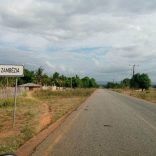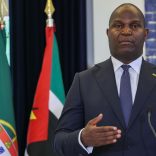Government optimistic that Mozambique will come off FATF “grey list”
The economic problem in Mozambique is long term and systemic – Hanlon

File photo / The Xiquelene market in Maputo
The President and senior ministers have tried to argue that the current crisis is caused by special factors such as falling commodity prices and the global recession, but two of the main national think tanks, IESE and CIP, say the problem is long term and structural.
Imports (excluding the mega projects) were 38% of GDP in 2014, showing the lack of domestic production, notes the Centro de Integridade Publica (CIP), in a paper issued 21 June. And it makes the same point as the IMF about the huge and inflationary increase in the money supply without an increase in domestic production. Domestic credit increased 44% in the year April 2015 to April 2016.http://www.cip.org.mz/images/
A set of three papers by Carlos Castel-Branco and Fernanda Massarongo issued 6, 9 and 14 June by IESE (Instituto de Estudos Sociais e Economicos) shows how Mozambique has, since the end of the war in 1992, failed to create a diversified and articulated economy serving local needs. Instead the economy was centred on mineral-energy exports plus a few export crops – sugar, tobacco and bananas.
The issue is how one builds domestic business and capital. “The basis of accumulation of the emerging national capitalist classes is the link with multinational capital,” write Castel-Branco and Massarongo. Public debt is part of “a strategy of primitive accumulation by way of expropriation of of the state, even beyond its economic possibilities.” They note that “60% of the debt was to build large infrastructure associated with mega projects, and a sixth of the debt is government guarantees for private debt illegally taken by the previous executive. Thus more than 75% of the debt was to finance the accumulation by [international and domestic] private capital and not for the consumption of citizens or the state.”
Public resources are the basis of capitalist development. “The Mozambican state capitalized rent-seeking oligarchies and domestic speculators, supported by the global financial system, using the strategy of public investment in the extractive core of the economy, as well as real estate speculation and weapons,” they continue. Much is made of combating corruption, but “it is difficult to disentangle ‘corruption’ from primitive accumulation (without which there is no capitalism). At what point is the systematic expropriation the State in favour of private capital accumulation definable as corruption? What distinguishes the case of a state agent appropriating public funds for personal benefit and another public official who delivers public resources (various minerals, hydrocarbons, land, infrastructure) to multinational corporations and domestic oligarchs?”
Until a year ago, the IMF was praising the Mozambican economy. Now it wants to impose a three part package. Austerity means cuts to social services and probably drastic job cuts and unemployment. Privatization is part of the agenda, accelerating the process of giving state companies and land to “international capital and national oligarchs,” they argue. Restricting access to domestic capital works against domestic business, but supports international companies with access to capital. This package will “aggravate the economic, financial and social crisis rather than helping to resolve it.” And tit will make it harder to diversify the economy to create jobs and basic goods. (IDeIAS 87,88,89http://www.iese.ac.mz/cronica-
By: Joseph Hanlon













Leave a Reply
Be the First to Comment!
You must be logged in to post a comment.
You must be logged in to post a comment.